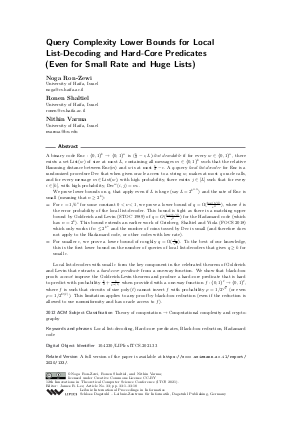@InProceedings{ronzewi_et_al:LIPIcs.ITCS.2021.33,
author = {Ron-Zewi, Noga and Shaltiel, Ronen and Varma, Nithin},
title = {{Query Complexity Lower Bounds for Local List-Decoding and Hard-Core Predicates (Even for Small Rate and Huge Lists)}},
booktitle = {12th Innovations in Theoretical Computer Science Conference (ITCS 2021)},
pages = {33:1--33:18},
series = {Leibniz International Proceedings in Informatics (LIPIcs)},
ISBN = {978-3-95977-177-1},
ISSN = {1868-8969},
year = {2021},
volume = {185},
editor = {Lee, James R.},
publisher = {Schloss Dagstuhl -- Leibniz-Zentrum f{\"u}r Informatik},
address = {Dagstuhl, Germany},
URL = {https://drops.dagstuhl.de/entities/document/10.4230/LIPIcs.ITCS.2021.33},
URN = {urn:nbn:de:0030-drops-135724},
doi = {10.4230/LIPIcs.ITCS.2021.33},
annote = {Keywords: Local list-decoding, Hard-core predicates, Black-box reduction, Hadamard code}
}

 Creative Commons Attribution 3.0 Unported license
Creative Commons Attribution 3.0 Unported license

